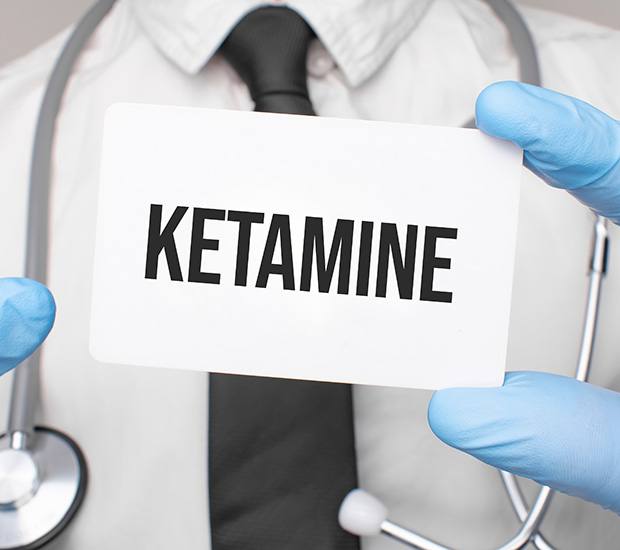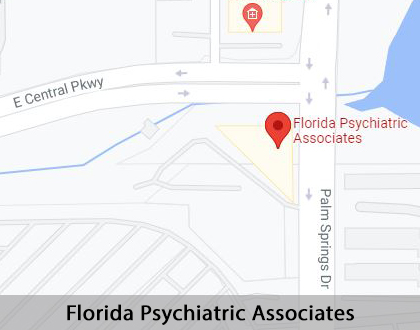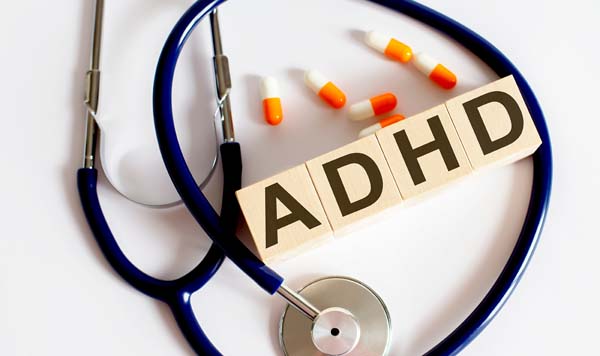Ketamine Therapy Altamonte Springs, FL
Ketamine treatment has many applications, including the treatment of severe depression. Now, you may have heard scary things about ketamine, such as it is a potentially harmful street drug. However, few people know that ketamine is also a legitimate medication. Ketamine is often used in medical clinics to treat a range of conditions.
Florida Psychiatric Associates does not provide ketamine treatment. However, it is available in the surrounding area.
Understanding Ketamine Therapy
Ketamine has been part of the medical system for about 60 years. Doctors across the globe use ketamine to put patients to sleep during surgery. Medical providers also use ketamine to ease patient discomfort during tests and procedures. At the correct dose, ketamine produces a trancelike state. Patients feel calm and relaxed, and they experience less pain.
Researchers have also discovered these effects may play a role in easing depression. This type of professional ketamine treatment takes place inside a medical clinic. In most cases, ketamine treatment is administered through an IV. Some forms of ketamine treatment are administered through a nasal spray. Patients can use these treatments at home, under a doctor's guidance.
“Ketamine has been part of the medical system for about 60 years.”
Medical Uses for Ketamine Therapy
Researchers believe that ketamine treatment targets NMDA receptors, which control many physical processes. A substance known as glutamate activates NMDA receptors. Ketamine may boost the amount of glutamate in the brain. This neurotransmitter acts on NMDA receptors to create a cascading effect within the brain.
Ketamine can help neurons communicate with each other. Over time, this process may alter the patient's mood. Ketamine affects cognition and thought patterns too. In patients with severe mental illness, ketamine may provide lasting relief.
Doctors often use ketamine treatment for patients with treatment-resistant depression. It may also relieve symptoms linked to anxiety, bipolar disorder, and obsessive-compulsive disorder (OCD). Some research also suggests that ketamine treatment may ease post-traumatic stress disorder (PTSD), reducing a patient's risk of suicide.
“Doctors often use ketamine treatment for patients with treatment-resistant depression.”
How Ketamine Therapy Works
About two-thirds of patients report ongoing symptoms after their first round of mental health treatment. More than 30% continue to experience symptoms even after several treatments. But a majority of patients respond favorably to ketamine. One study found that about 70% of patients responded well to IV ketamine. In addition, patients reported significant symptom relief after treatment.
After the initial treatment phase, many patients need an occasional "booster" dosage. Unlike traditional antidepressants, patients do not have to take medication daily. Instead, they receive their booster dosage as needed. In some cases, patients go several months between treatments.
Many new patients express concern about ketamine. They heard that ketamine is a "party drug," and they worry about the possibility of addiction. Fortunately, medical ketamine has few risks. The team carefully calculates the proper dosage, taking into account the patient's unique needs. Then, they administer the drug in a clinical setting
Throughout treatment, a medical doctor oversees the patient’s care. The doctor determines whether to adjust the dosage to ensure safety. Patients receive ongoing monitoring during the treatment process. Adverse outcomes of ketamine treatment are rare.
“One study found that about 70% of patients responded well to IV ketamine.”
Check out what others are saying about our mental wellness on Yelp: Ketamine Therapy in Altamonte Springs, FL
What to Expect from Ketamine Therapy
Patients begin by checking into the infusion clinic. If this is the patient’s first visit, they may have an in-depth consultation. During later visits, the patient can proceed straight to treatment. A team member checks a patient’s vital signs and discusses current symptoms. Next, the team member cleans the patient's arm and inserts the IV line. Then, they administer the patient’s customized dosage.
Most patients feel calm and relaxed during treatment. But rest assured that a team member remains nearby. In rare cases, some patients may feel agitated during treatment. These side effects usually pass within fifteen minutes. In the meantime, the team member can provide support and reassurance.
IV infusions usually take about 40 minutes, and patients can relax during treatment. Afterward, most patients feel tired, dizzy, or groggy. Patients should not drive immediately after ketamine treatment. It is also not a good idea to return to work or make significant decisions. Patients should plan to have a friend or family member take them home. Most patients spend the rest of their treatment day relaxing on the couch.
Patients should avoid alcohol, marijuana, and other drugs before treatment. Our team can provide more information about which medications and substances are safe to use around the time of treatment. We recommend that patients eat a healthy meal the day of their infusion. Patients might find it helpful to spend some time relaxing before treatment. Some patients feel a little nervous before their first infusion. Taking time to meditate or perform breathing exercises can help calm nerves.
Ketamine treatment uses small needles to minimize discomfort. If the patient is feeling anxious about the injection, let our team know right away. We can take steps to make them more comfortable.
“IV infusions usually take about 40 minutes, and patients can relax during treatment.”
Questions Answered on This Page
Q. What conditions does ketamine treatment treat?
Q. What happens during ketamine treatment?
Q. What are some side effects of ketamine treatment?
People Also Ask
Q. What are some treatment options for depression?
Side Effects of Ketamine Therapy
Sometimes, ketamine treatment can cause side effects. Common side effects include:
- Disorientation
- Drowsiness
- Reduced pain perception
- Unusual thoughts
Other side effects can include feeling anxiety, agitation, nausea, vomiting, and sleep disturbances. In rare cases, patients might experience hallucinations. These side effects usually pass quickly. They often occur while the patient is still under medical supervision. If a patient experiences an unpleasant side effect, the infusion team can ease their symptoms. They can also adjust the dosage for next time. Keep in mind that most side effects are short-lived.
“If a patient experiences an unpleasant side effect, the infusion team can ease their symptoms.”
Frequently Asked Questions
Q. Is ketamine addictive?
A. Many may have heard that ketamine is a popular street drug. Some people indeed abuse ketamine. But in a clinical setting, patients receive a controlled dosage. The medical team monitors patients closely and adjusts their dosage as needed. There is currently no evidence that ketamine treatment increases your overall risk of addiction.
Q. Does ketamine treatment work faster than other treatments?
A. Most treatments for depression work slowly. Antidepressants may take several weeks to reach their full effectiveness, and treatment may last for many months. Transcranial magnetic stimulation (TMS) and electroconvulsive treatment (ECT) take time, too. Ketamine takes effect within hours and often provides same-day results.
Q. Is ketamine treatment FDA-approved?
A. Approved as an anesthetic, The FDA has determined that ketamine meets the necessary safety criteria for patient use. However, they have not approved some forms of ketamine for the treatment of mental disorders. Rest assured that ketamine treatment is not dangerous or harmful. However, since it may not be FDA-approved for depression, insurance may not cover the treatment.
Q. Can children receive ketamine treatment?
A. Most providers offer ketamine treatment exclusively to adults. Clinical trials are currently underway to determine whether ketamine is safe for teenagers. Our team can provide more information about clinical trials and resources for teens.
Q. Can adults with addiction disorders receive ketamine treatment?
A. Ketamine may help ease the symptoms of addiction disorders and encourage long-term sobriety. But since ketamine can get abused, doctors must consider whether ketamine is appropriate for a patient with a history of addiction. Our team can help you weigh the risks and benefits of ketamine treatment.
Change Is Possible – Call Us Today
Life isn’t always easy. Are you struggling? Are you looking for a highly personalized and professional approach tailored to your individual needs? Instead of waiting around, call us today. You should know that there is hope for a better tomorrow.
Definitions
Learn More About Ketamine Therapy
Ketamine treatment can deliver results for patients struggling with stubborn symptoms. If you are curious about ketamine treatment, let Florida Psychiatric Associates in Altamonte Springs provide more information. Call us at 407-960-5633 to learn more about our services.
Helpful Related Links
- American Psychiatric Association (APA). Mental Health Topics. 2021
About our business, license, and website security
- Florida Psychiatric Associates was established in 2003.
- We accept the following payment methods: American Express, Cash, Discover, MasterCard, and Visa
- We serve patients from the following counties: Seminole County, Volusia County and Orange County
- We serve patients from the following cities: Altamonte Springs, Lake Mary, Sanford, Deltona, Orange City, DeBary, Apopka, Maitland, Winter Park and Orlando
- FL (License #ME68974). View License Information and Specifics
- National Provider Identifier Database (1518910835). View NPI Registry Information
- Norton Safe Web. View Details
- Trend Micro Site Safety Center. View Details
Back to top of Ketamine Therapy







